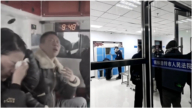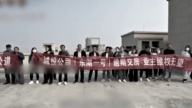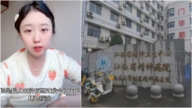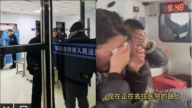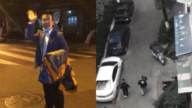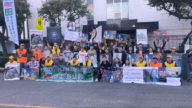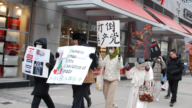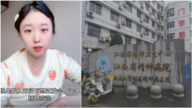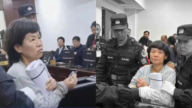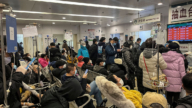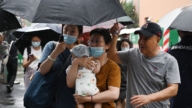【新唐人2013年10月30日讯】江西新余“新公民运动”活跃人士:刘萍、魏忠平和李思华,素有“新余三君子”之称,他们三人由于要求官员公开财产、并声援被捕异议人士,被控涉嫌“非法集会”等罪名。28号,新余市渝水区法院开庭审理,但三名被告当庭解除了对辩护律师的委托书,以示对法院“非法行为”的抗议,案件押后再审。因中共动用上千警力抓捕或软禁声援的民众,以及为难辩护律师,国际舆论也给予强烈关注。
据了解,美国、加拿大和欧盟的驻华使团负责人权事务的官员,28号上午也前往新余法院表达关注,但被警方拦截在警戒线外,无法进入法庭。
28号晚10点多,江西新余维权人士刘萍、魏忠平、李思华等三名被告的六名辩护律师:张雪忠、郑建伟、陈光武、刘金滨、庞琨、李金星,针对开庭情况发表声明说:由于法官违法行为,律师的辩护工作已无法起到应有的作用,因此三名被告当庭解除对我们的辩护委托。合议庭宣布休庭,给被告人15天时间,重新委托辩护律师。
“新余三君子”辩护律师之一庞琨:“主要是当事人认为法庭不能保证律师的权力,律师没有办法正常的履行职务,法庭威胁律师,当事人解除了委托,要重新聘请律师。”
刘萍女儿廖敏月表示,六名律师当庭指出,法院超期羁押三名被告涉嫌违法,要求合议庭法官回避,但遭到拒绝,而且,法官的态度恶劣,多次打断律师的发言。
江西新余维权人士刘萍女儿廖敏月:“他们现在不让我的律师说话,再开下去对这个案件只有害而无利,所有的律师举手示意都不让律师说话,这种庭还有什么好开的?”
今年4月,刘萍三人因在刘萍家中举标语拍照,要求当局释放被关押的新公民运动人士,后来又因举牌要求官员公开财产,被中共逮捕,三人分别被控以“非法集会罪”、“扰乱公共场所秩序罪”及“利用邪教组织破坏法律实施罪”。
三人被抓后,引来中国网民的声援。开庭前一周,中国各地已经有声援者陆续被当地警方警告不得前往新余市。
不过仍有大批声援者不顾警方阻挠前往。在途中,网友遭遇上千警力的围追堵截,网民“秀才江湖”、“公民小彪”、“刘沙沙”、“杨匡”等数人被警方抓捕关押,28号晚才被陆续放出。
27号提前一天前往新余声援刘萍案的网民“公民小彪”说,有朋友告诉他,新余当局提前一周就开始戒严,火车站、汽车站到处都设有关卡。
网民“公民小彪”:“我们防止意外为了安全,我们就在新余隔壁城市那个宜春,坐车就坐到宜春,设卡的交警就查车,每台车都要查,每个人都要检查身份证,然后我们在第一个关口,他们登记身份证,只是登记一下,我们就觉得很侥幸。”
不过,当“公民小彪”等网友刚到新余市郊区,过第二个关卡时,就被警察拦截抓捕,并把他们送到当地派出所,关押22小时后才放出。
网民“秀才江湖”:“27日下午,我和庞琨律师,当事人李思华的代理律师,庞琨律师,我和他一起从深圳过来的,在公交车上,准备去宾馆的路上,就被他们控制了,把我带到派出所。”
“秀才江湖”被关押20多个小时后,被国保送回原籍浙江长兴县。庞琨也受到了不同程度的骚扰。26号在深圳时,庞琨就曾被当地公安扣押3个小时,并责令他不要到新余为当事人辩护。
庭审当天,陈光武、郑建伟、李金星等辩护律师在法庭外被法警检查律师证。而刘萍的证人刘喜梅在庭审前更被警方以“扰乱公共秩序”行政拘留﹔新余一批维权人士邹桂琴、黄慧敏等也被限制人身自由。
28号,律师李方平发微博说:小小新余,惊动全国安保,目前了解到已经超过十个省市在联动维稳。他认为,当局在江西新余这个偏远的地方,审判新公民运动的成员是有意试探民间的反应。
采访编辑/李韵 后制/陈建铭
Lawyers for Members of New Citizens Movement Dismissed During Trial
Liu Ping, Wei Zhongping and Li Sihua are members
of the New Citizens Movement, Xinyu, Jiangxi Province.
They are known as “Xinyu’s three noble characters".
They are known for urging disclosure of officials
assets, and supporting detained activists.
The three were accused of “illegal assembly".
On October 28, Yushui District
Court in Xinyu City opened the trial.
All three dismissed their lawyers in court, in order to protest
the court’s illegal behavior. The hearing was adjourned.
Meanwhile the regime dispatched thousands of police to
arrest their supporters, or place them under house arrest.
The regime also made the lawyers’ defense difficult
in court, and the case has drawn attention globally.
Sources indicate that human rights officers from Embassies
including the US, Canada and European Union countries,
went to Xinyu court on October 28, but were refused entry.
At 10pm, the six lawyers of the three
defendants issued a statement.
Because of the judges’ illegal behaviors,
the lawyers are unable to fulfill their role.
Thus, the three defendants have dismissed their lawyers.
The collegial panel announced the trial was adjourned,
and gave the defendants 15 days to re-hire lawyers.
Pang Kun, defense lawyer: “Because the defendants
understood that the court can’t guarantee lawyers’ rights,
lawyers can’t play their role, and were threatened in court.
Thus the defendants dismissed them,
and they need to hire lawyers again."
Liu Ping’s daughter Liao Minyue
spoke about what happened in court.
The six lawyers told the court that it illegally
extended the detention of the three defendants.
The lawyers requested the judges of the collegial
panel to step back, but their request was denied.
The judge’s attitude was very bad,
interrupting lawyers speeches many times.
Liao Minyue: “The judge didn’t allow the lawyers to
speak, so it wasn’t any good to carry on with the trial.
When our lawyers raised their hands to
make points, the judge ignored them.
What is the point of carrying on with such a trial?"
In April, the three activists took photos holding placards.
They were requesting the regime to release
members of the New Citizens Movement.
They also urged the disclosure of officials’
assets, and were subsequently arrested.
The three defendants were separately accused of
“illegal assembly", “disturbing public order" and
“using an evil cult to undermine law enforcement".
After their detention, netizens gave them much support.
One week before the hearing, some supporters received
a warning from the local police not to go to Xinju City.
However, many supporters ignored the warning.
They traveled to Xinyu City, but
were stopped by thousands of police.
Netizen “Xiucai Jianghu", “Citizen Xiaobiao",
“Liu Shasha" and “Yang Kuang" were arrested.
They were successively released
on the evening of October 28.
Netizen “Citizen Xiaobiao" went
to Xinyu City, a day before the trial.
He says that a friend told him the regime placed
heavy security in Xinyu one week before the trial.
The train stations and bus stations
were equipped with checkpoints.
Netizen “Citizen Xiaobiao": “For our safety, we
got off the bus at Yichun which is next to Xinyu City.
The traffic police started checking
every bus, and every passenger’s ID.
They wrote down our ID at the first checkpoint.
They just wrote it down, so we were lucky."
When “Citzen Xiaobiao" and other netizens arrived
in Xinyu’s rural area, there was a second checkpoint.
The police detained them at a local police
station, and they were released after 22 hours.
Netizen “Xiucai Jianghu": “On the afternoon of October
27, lawyer Pang Kun and I took a bus from Shenzhen.
We were detained on the bus on the way to
the hotel, and they took us to a police station."
“Xiucai Jianghu" was held for more than 20 hours.
Domestic Security Division personnel then sent him
back to his hometown in Changxing County, Zhejiang.
Pang Kun was also harassed.
On October 26, in Shenzhen, Pang was
detained for three hours by local police.
The police told him not to go to Xinyu to defend activists.
The police checked Cheng Guangwu and
other lawyers’ practice licenses outside court.
Liu Ping’s witness, Liu Ximei was detained before
the trial on allegations of “disturbing public order".
Freedom of activists in Xinyu was restricted,
including Zou Guiqin and Huang Huimin.
On October 28, lawyer Li Fangping wrote on Weibo:
The regime used national security
forces to deal with small Xinyu.
It understood that tens of provinces are maintaining stability.
Li says that the regime held a hearing of members
of the New Citizens Movement in Xinyu, a remote
place, and it intended to test people’s reaction.


